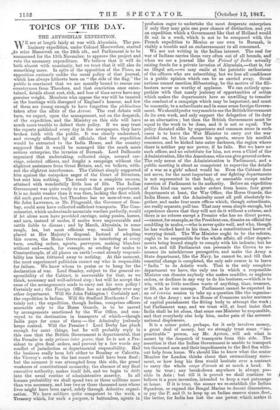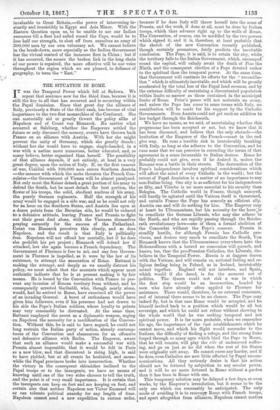TOPICS OF THE DAY.
THE ABYSSINIAN EXPEDITION.
WE are at length fairly at war with Abyssinia. The pre- liminary expedition, under Colonel Merewether, started *to seize Massowah on the 28th ult., and Parliament is to be summoned for the 19th November, to approve the project and vote the necessary expenditure. We believe that it will do both almost with unanimity, but we trust that it will also do something more. In spite of the opposition of the Times, an opposition curiously unlike the usual policy of that journal, which has always hitherto been on "the side of the flag," the public is convinced that we are morally bound to rescue our countrymen from Theodore, and that conviction once enter- tained, details about cost, risk, and loss of time never have any genuine weight. Members who oppose the war will be taunted on the hustings with disregard of England's honour, and few of them are young enough to have forgotten the plebiscitum taken after the affair of the Arrow. The real debate will turn, we expect, upon the management, not on the despatch, of the expedition, and the Ministry on this side will have much more trouble to defend their policy. If we may trust the reports published every day in the newspapers, they have broken faith with the public. It was clearly understood, and strongly affirmed by all officials, that the expedition would be entrusted to the India House, and the country supposed that it would be managed like the much more serious enterprise, the invasion of Burmah. Lord Dalhousie organized that undertaking. collected ships, secured car- riage, selected officers, and fought a campaign without the slightest assistance from Great Britain, and, we believe, with- out the slightest interference. The Cabinet simply supported him against the outspoken anger of the Court of Directors, but sent him nething. The result was a complete success, attained with wonderfully little loss of life. The Indian Government was quite ready to repeat that great experiment. It is no doubt weaker than it was then, lacking the fleet which did such good service, but Theodore has no men-of-war, and Sir John Lawrence, or Mr. Fitzgerald, the Governor of Bom- bay, could soon have collected sufficient transports. The Com- missariat, which understands mountain warfare perfectly, would if let alone soon have provided carriage, using ponies, horses, and men, instead of mules, if mules were unprocurable and cattle liable to disease ; and by March, Abyssinia, in some rough, lax, but most efficient way, would have been placed at Her Majesty's disposal. Instead of adopting this course, the Home Government is interfering at every turn, sending orders, agents, purveyors, making blunders without end—such, for example, as sending for mules to Constantinople, of all places on earth !—and already responsi- bility has been frittered away to nothing. At this moment, the most experienced politician cannot say who is responsible for failure. We know whom to praise or to hang for the declaration of war. Lord Stanley, subject to the general re- sponsibility of the Cabinet, is answerable for that, as we think, necessary and well-advised step ; but will he accept the onus of the arrangements made to carry out his own policy ? Certainly not ; the Foreign Office has no authority over any other department. Will Sir John Pakington Certainly not ; the expedition is Indian. Will Sir Stafford Northcote ? Cer- tainly not ; the expedition, though Indian, comprises officers amenable only to the Horse Guards, is to be moved by arrangements sanctioned by the War Office, and con- veyed to its destination in transports of which—though India pays for some of them—the Admiralty jealously keeps control. Will the Premier ? Lord Derby has pluck enough for most things, but he will probably reply in this case that the British Government is departmental, that the Premier is only primus inter pares, that he is not a Pre- sident to give final orders, and prevent by a few words any conflict of jurisdiction or departmental responsibility. Had the business really been left either to Bombay or Calcutta, the Viceroy's order in the last resort would have been final ; but the moment it was attempted from this side, the grand weakness of constitutional monarchy, the absence of any final executive authority, makes itself felt, and we begin to drift into the usual routine of administrative anarchy. In all human probability we shall spend two or three millions more than was necessary, and lose two or three thousand men whose lives might have been saved, solely through defective organi- sation. We have soldiers quite competent to the work, a Treasury which, for such a purpose, is bottomless, agents in profusion eager to undertake the most desperate enterprises if only they may gain one poor chance of distinction, and yet an expedition which a Government like that of Holland would fit out in a week, which is not to be compared with the French expedition to Mexico or our own to Burmah, is visibly a trouble and an embarrassment to all concerned.
We are not writing in the Indian interest. The zeal for war of Indians carries them very often out of all bounds, an& when we see a journal like the Friend of India actually raising funds for a private invasion of Abyssinia,—that is, for an illegal act,—we may smile at the patriotic enthusiasnk of the officers who are subscribing, but we lose all confidence in a public opinion which can be so carried away. Great nations cannot sanction filibustering, be the motive of the fili- busters never so worthy of applause. We can entirely sym- pathize with that manly jealousy of opportunities of action which makes the departments here so unwilling to transfer- the conduct of a campaign which may be important, and must be romantic, to a subordinate and in some sense foreign Govern- ment. We shonldprefer verymuchto see the BritishGovernmenb. do its own work, and only support the delegation of its duty as an alternative ; but then the British Government must be- equal to the work to be done, and it is not so equal. The- policy dictated alike by experience and common sense in sachk cases is to leave the War Minister to carry out the war- decided on, let him choose his agents, secure his needful resources, and be kicked into outer darkness, the region where there is neither pay nor power, if he fails. But we have no- such officer, and no substitute for him, not even a Chief of the- Administration, like the Americans, who can give general orders. The only nexus of the Administration is Parliament, and &- public meeting is about as competent to supervise the details- of a war as a girls' school would be. Even the Cabinet does- not serve, for the most important of our fighting departments.. is not represented in that body, or amenable except under coercion of Parliament to its authority. Before an expeditiom of this kind can move under orders from home, four great departments at least, the War Office, the Horse Guards, the India House, and the Admiralty must all pull absolutely to- gether, and make four more offices which, though subordinate, are really separate, pull too. That may seem simple enough, but experience shows that they will not dolt without a referee, anch there is no referee except a Premier who has no direct power, —cannot, for example, as the President can, dismiss an official for muddling in mules,—who is never quite well, and who, though he has worked hard in his time, has a constitutional horror of- worrying detail. The War Minister ought to be the referee,. ought to be responsible for the whole affair, all other depart- ments being bound simply to comply with his indents; but he: is not, and till Parliament can persuade the Crown to re- nounce its mischievous prerogative, and make the Army a. State department, like the Navy, he cannot be, and till that. essential change is completed, the only safe course is to leave. " India " to do Asiatic work. That is the only complete. department we have, the only one in which a responsible. Minister can dismiss anybody who makes muddles, or neglects: orders, or declines in any way to do his business,—which is to. win, with as little needless waste of anything, time, treasure, or life, as he can manage. Parliament cannot be expected in- an ad interim session to take up a question like the organiza- tion of the Army ; nor is a House of Commons under sentence of capital punishment the fitting body to attempt the work ;. but Parliament may, and we trust will, at least insist that. India shall be let alone, that some one Minister be responsible,. and that everybody else help him, under pain of the severest. national displeasure.
It is a minor point, perhaps, for it only involves money,. a great deal of money, but we strongly trust some practicable" person, say Mr. Ayrton, will ask what is. meantby the despatch of transports from this side. The assertion is that the Indian Government is unable to transport ten thousand men and their impedimenta to the Red Sea with-- out help from home. We should like to know what the senior- Member for London thinks about that extraordinary state- ment, or how long his firm would hesitate over a contract- to carry the whole corps d'arnte'e at so much a head. It. may be true ; any break-down anywhere is always pos- sible in Asia ; but till it is proved we shall continue to. believe it a pare invention, intended to keep a vast patronage at home. If it is true, the sooner we re-establish the Indian Squadron, or expand the Bengal Marine to decent dimensions,. or pay the P. and 0. to keep up an Indian reserve steam fleet,. the better, for India has lost the one power which makes it invaluable to Great Britain,—the power of intervening in- stantly and irresistibly in Egypt and Asia Minor. With the Eastern Question upon us, to be unable to use our Indian resources till a fleet had sailed round the Cape, would be to lose half our strength, to shut off from ourselves an army of -300,000 men by our own voluntary act. We cannot believe in the break-down, more especially as the Indian Government has the virtual control of the immense fleet in China ; but if it has occurred, the sooner the broken link in the long chain .ef our power is repaired, the more effective will be our voice throughout the region which we are pleased, in defiance of geography, to term the "East."































 Previous page
Previous page